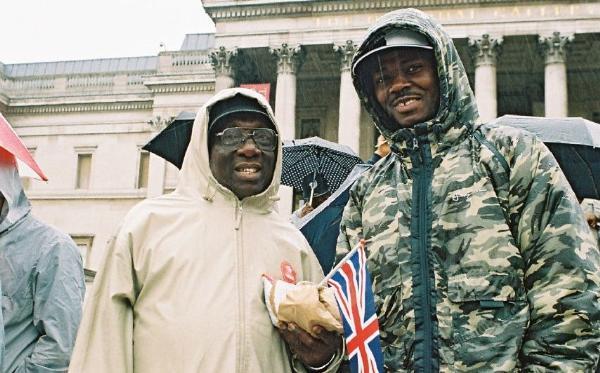The Mayor of London’s recent declaration of support for an amnesty for illegal immigrants has added weight to the call made by Cardinal Cormac Murphy-O’Connor more than two years ago. Austen Ivereigh explains how a regularisation measure would benefit not just undocumented migrants forced to live in the shadows, but British society as a whole.
It is hard for the law to keep up with human realities, as one Middle-Eastern family discovered two thousand years ago, when they were forced to trek (she, pregnant, on a donkey) to register their presence in a place they no longer lived.
Joshua (not his real name) is an African, well-loved in his Catholic parish in a smart part of London. He has been in the UK for more than eight years, speaks English better than many natives, has been working hard at a skilled job to give his children at home a decent education, and is always on hand to help out in the church. Recently he lost his job of many years because his employer, anxious to avoid the fines the Home Office has introduced for employers who give jobs to illegal immigrants, suddenly asked to see his passport.
Forcing Joshua into unemployment does not benefit anyone: not Joshua, not his children, not his employer. The Home Office hopes he will go home, but he won’t, not after this long. “This is my home,” Joshua says of the UK.
People like Joshua are not in the same category as many Poles or Lithuanians who come to the UK for a time and then return, who move back and forth. Joshua invested hugely in coming here and has given his life since then to this place. He is not going back. But he would be headed for destitution were it not for the parishioners who care for him (“He’s part of our family”, says his parish priest) and who offer him cleaning and babysitting jobs, to keep his children back home in food and good education.
That parish is aiding and abetting an illegal immigrant, as parishes do up and down the country, every day. So great is the scale of this assistance that it should really be considered a mass act of civil disobedience – compelling evidence, in the twenty-first century, that Roman Catholics are still disloyal subjects.
But of course that’s silly. Ask a parishioner in Joshua’s parish, or his parish priest, if they thought they were disobeying the law, and they would laugh. They know, as one US Catholic bishop says of undocumented migrants, that “they are not breaking the law; the law is breaking them.”[1]
When the Cardinal made his call for citizenship for people like Joshua at the first Mass for Migrant Workers at Westminster Cathedral in May 2006, he was reflecting the experience of hundreds of such parishes across the UK. The Church is a place of safety and support for migrants, many of whom have come through the asylum system and have been made to wait years before having their cases finally refused, or who came to study, and put down roots, or have children in our schools. There are at least 400,000 people in this category in London alone, people who live a limbo existence: present, yet not recognised as present by the law.
Strangers into Citizens, the London Citizens campaign inspired by the Cardinal’s call, has gathered a number of typical stories, many of them from members of London’s Catholic congregations, which show how the idea of “illegal immigrants” as criminals and law-breakers can only be sustained by never talking to one.[2]
The mayor and the Cardinal
‘Archbishop backs amnesty for Britain’s illegal immigrants’ is how one newspaper headlined it a few weeks ago[3] – suggesting that it was the Archbishop of Westminster supporting the Mayor of London’s idea. In fact, it was Cardinal Cormac Murphy-O’Connor who, in May 2006, proposed[4] the idea of granting legal status to a large number of Britain’s 600,000-strong population of “invisibles”, for their good, and that of the UK. And it was Boris Johnson who last month came out in support of the idea, causing the immigration minister, Phil Woolas, to brand him a “naive nincompoop”.[5] The Cardinal, interviewed that weekend, repeated his support, causing the Daily Express to splutter in indignation[6] and the Catholic Herald to claim there was an “outcry” –which seemed to mean only that Tory MP Ann Widdecombe and Sir Andrew Green of MigrationWatch disagreed with him. [7]
Why do both the Conservative Mayor of London and the leader of the Catholics of England and Wales support regularisation, along with the Liberal-Democrat party, a number of trade unions (including Unite the Union and Unison), Catholic parliamentarians such as Jon Cruddas and Baroness Shirley Williams, leading Conservative strategists such as Anthony Browne, and business federations such as London First and the Cleaning and Services Support Association (CSSA)?
Because they have looked at the idea, and believe it is a sensible and humane way of dealing with the human consequences of the UK’s asylum and immigration system, one which has left tens of thousands of people hanging around for years in the Home Office backlog.
And because they have looked at the most recent example of a successful regularisation measure, that of Spain in 2005. In that year, 700,000 people received legal status in a move which most Spaniards believe benefitted the country. It has paid for itself many times over in tax revenue, liberated tens of thousands from limbo and exploitation, extended the State’s control over the “underground” economy and, by shrinking the pool in which people-trafficking thrives, has resulted in levels of “illegal” immigration decreasing since then. [8]
The immigration watchdog MigrationWatch, on whose expertise the critics of the idea depend, claims that Spain proves the opposite: that “amnesties” act as a magnet or green light to further illegal immigration, and are therefore irresponsible. The Daily Telegraph, citing MigrationWatch, claims that “Spain has had six amnesties and more illegals have had to be regularised each time – for example 40,000 in 2002 and 700,000 in 2005.”[9] In fact, Spain has only had one regularisation programme: that of 2005. Before then, the country had regular temporary guest worker schemes, where migrants could apply to work legally for a period of two years. Because Spain, with its notoriously low birth rate, was in constant need of more foreign workers, they would usually be granted a second work visa at the end of those two years. To call these “amnesties” is highly misleading, as are the attempts to persuade people that a similar regularisation programme in the UK would cost the taxpayer money because of the “benefits” to which they would be entitled.[10] In fact, most of the 600,000-odd “undocumented migrants” in the UK who have been in the country for many years are in their twenties and thirties, and are net contributors, when they are allowed to be, to the economy.
This is why British policy experts have convincingly argued what the case in Spain proves: that regularisation would be of great fiscal benefit. On the Left, the Institute for Public Policy Research (IPPR) said that regularisation would benefit the UK exchequer by about £1bn,[11] while the Conservative strategist Anthony Browne, until recently head of the think-tank Policy Exchange, believes it would be “economically efficient”. [12]
A compelling case
But while there is a good economic argument for regularisation (and the economic arguments against it remain unconvincing) this is not, primarily, an economic issue. It’s about the way we allow a large group of people in British society to be treated. Knowing who they are and hearing their stories is the first step.
An undocumented migrant lives in a dehumanising limbo: unable to assert rights, vulnerable to exploitation, living in fear and uncertainty. Regularisation seeks to replace that dehumanising limbo with a humanising pathway into citizenship, one that gives an opportunity to “earn” status. It does not throw open the borders, but starts from the single, devastating fact that most of the undocumented migrants in the country will never be deported; only about 30,000 are deported each year. It would cost billions and take decades to attempt to deport them all, and no one, least of all the Government, pretends otherwise.
Noting that "many [undocumented] migrants have been here for several years; some have even set down roots and started families", the Catholic Bishops of England and Wales declared themselves in favour of regularisation in a major teaching document earlier this year. "Without condoning illegal immigration,” they declared, “the Church’s position on this, as in other fields of human endeavour, does not allow economic, social and political calculations to prevail over the person, but on the contrary, for the dignity of the human person to be put above everything else, and the rest to be conditioned by it. The Church will continue to advocate compassion to allow the ‘undocumented’ an opportunity to acquire proper status, so that they can continue to contribute to the common good without the constant fear of discovery and removal." (‘Mission of the Church to the migrants in England and Wales’)
The Bishops did not advocate any particular policy or model of regularisation. There are many different kinds. Strangers into Citizens advocates, for example, a residence requirement of four years, followed by a two-year “pathway” during which people would be allowed to work legally. At the end of the two years, subject to criminal checks and community and employer references, leave to remain would be granted via a one-off measure.
The campaign has secured the support of many Bishops –among them the Archbishop of Birmingham, Vincent Nichols, and the Bishop of Brentwood, Thomas McMahon. Bishop McMahon described as "shameful" and "unjust" the Government's failure to regularise the position of thousands of long-term illegal immigrants in Britain. "For any Government to choose to do nothing about regularisation is irresponsible and leaves countless migrants vulnerable to exploitation and living in fear and in limbo," he told the congregation at the Mass for Migrants earlier this year. "They cannot work, they cannot claim benefit, they cannot get public housing. I can only describe it as shameful and unjust."
Converting Conservatives
So why do the Government and the leader of the Opposition pour cold water on the idea? The answer is fear: of looking soft on immigration at a time of rising concern at the impact of immigration on British society; of appearing to reward law-breaking and subterfuge; of looking weak and ineffectual.
Which is why the Strangers into Citizens campaign has sought to build a broad alliance, not one merely of “interested parties” (migrant advocacy groups, refugee rights organisations, and so on) but of the many hundreds of Church groups, often very small, which support and welcome the stranger. The message from the Churches and Mosques in Britain is that these are people who form part of our congregations. They are beloved of God. As Pope John Paul II said in 1996: “In the Church no one is a stranger, and the Church is not foreign to anyone, anywhere. As a sacrament of unity and thus a sign and a binding force for the whole human race, the Church is the place where illegal immigrants are also recognised and accepted as brothers and sisters.”[13]
The argument for regularisation is a civil matter; the fact that undocumented migrants are welcome in Churches doesn’t mean, per se, that they should automatically be given status. But the argument for regularisation begins with that welcome – the welcome that listens to the stranger’s story, and then considers how to assist him or her. It may be English lessons, or help with bureaucracy or finding food and shelter. But it will also involve helping that person to find their way into proper legal status.
In November, Boris Johnson gave an interview to Channel 4 News in which he said the expulsion of London's 400,000 illegal immigrants was "just not going to happen". While he is powerless to change national policy on the issue, Johnson said he wanted to "lead the debate" by commissioning a study into the feasibility of the idea. He said he favoured the idea of an "earned amnesty", whereby, after a period of about five years, individuals could "show their commitment to this society and to this economy" to earn the right to stay. "We want to look in detail at what the economic impact of such an earned amnesty system would be," he said.
Although Her Majesty’s Opposition remains resistant to the idea,[14] the Catholic former Conservative leader, Iain Duncan-Smith, recently attacked one of the foundations of the current system: the policy which depends on destitution to deter newcomers. Duncan-Smith’s Centre for Social Justice (CSJ) issued a report saying that asylum seekers who are refused permission to live in the UK but who are unable to return to their country of origin should be allowed to work and to access health care. "The policy of making asylum seekers destitute is mean and nasty and has not worked," he said.
The CSJ found at least 26,000 failed asylum seekers in the UK surviving on Red Cross food parcels and has highlighted a backlog of 280,000 failed applications which could take 20 years to clear. The report, Asylum Matters, said the existing system forces many refused applicants to face destitution or disappear off the authorities' radar, drifting into illegal employment, prostitution or crime. It strongly criticised a system which automatically refused 90 per cent of those who applied for asylum, but admitted 30 per cent through on appeal, condemning thousands to a limbo existence waiting on their future.[15]
Here to stay
Looking back on the two years since the launch of the Strangers into Citizens campaign, it is remarkable how what was never spoken of previously has come to the fore of political debate. The degrading circumstances of a shadowy sub-class of British citizens have begun to prick consciences. Most people are unaware of the number of undocumented migrants there are in this country, and of the impossibility of deporting them. The choice is not one of welcome versus deportation, but of welcome versus ostracism and marginalisation. New Labour has strongly resisted the idea of a pathway into citizenship; it fears that looking soft on immigration will lose it the election. But some sections of the Conservative Party, along with the Liberal-Democrats, have shown a new openness to the possibility. And the idea has generated a stream of newspaper articles, softening up a still largely resistant public to the idea.[16]
Two things are certain: the border-tightening policies of this Government will continue, and most of the 400,000 undocumented migrants in the UK will not be going home. All the parties support stricter monitoring of the borders, which is inevitable in an era of cheap, globalised travel. A clampdown on the shadow economy, which undermines fair wages and involves exploitation of undocumented migrants, is both inevitable and desirable. The question is whether border-tightening and immigration enforcement should be accompanied by a regularisation measure. Without it, there is a risk of simply pushing the problem further underground: expanding, not shrinking, the shadow economy, creating even greater misery and destitution, and therefore failing to reduce the numbers of “illegal” immigrants. Alternatively the Government, this one, or more likely the next, can regularise, and so extend the role of the State over the shadow economy, enhancing the border-enforcement measures while taking tens of thousands of people out of limbo, enabling them to play a proper part in our society: dwelling among us, but strangers no longer.
At Christmas, the feast of a refugee family which invites us to welcome a stranger into our hearts, that is not a bad thing to hope for.
Austen Ivereigh was until recently co-ordinator of the Strangers into Citizens campaign. He is now lead organiser of West London Citizens. The Mass for Migrant Workers at Westminster Cathedral will be held next year on 4 May. Later that day, the second Strangers into Citizens rally will take place in Trafalgar Square.
[1]Bishop of Orlando, Thomas Wenski, quoted at www.justiceforimmigrants.org
[3]‘Archbishop backs amnesty for Britain’s illegal immigrants’, The Independent, 24 November 2008. http://www.independent.co.uk/news/uk/home-news/archbishop-backs-amnesty-for-
britains-illegal-immigrants-1032195.html
[4] ‘Cardinal suggests UK amnesty for illegal immigrants’, Ekklesia http://www.ekklesia.co.uk/content/news_syndication/article_06053migrant.shtml
[5]‘Immigration Minister brands Boris Johnson a “naive nincompoop” for suggesting illegal immigrant amnesty’, Daily Mail, 18 December 2008. http://www.dailymail.co.uk/news/article-1088726/Immigration-Minister-brands-Boris-Johnson-naive
-nincompoop-suggesting-illegal-immigrant-amnesty.html
[6] ‘Anger as Cardinal backs amnesty for illegal immigrants’, Daily Express, 24 November 2008. http://www.express.co.uk/posts/view/72578/Anger-as-Cardinal-backs-amnesty-for-illegal-
immigrants
[7] ‘Cardinal: give citizenship to migrants. Outcry after the Archbishop of Westminster backs London mayor over research into amnesty’, The Catholic Herald 28 November 2008, http://www.catholicherald.co.uk/articles/a0000424.shtml
[8] ‘Most Spaniards think amnesty worked’, BBC News 14 June 2006 http://news.bbc.co.uk/1/hi/uk/5080316.stm
[9]‘Boris Johnson calls for illegal immigrants amnesty’, the Daily Telegraph 21 November 2008, http://www.telegraph.co.uk/news/newstopics/politics/conservative/3498067/Boris-Johnson-
calls-for-illegal-immigrants-amnesty.html
[10]‘Immigrant amnesty bill to cost £4bn’, Daily Express, 10 December 2008 http://www.express.co.uk/posts/view/75002/Immigrant-amnesty-bill-to-cost-4billion
[11]See IPPR press release, June 2006: http://www.ippr.org.uk/pressreleases/?id=2169
[12] Anthony Browne, ‘Why we should grant illegal immigrants an amnesty’, The Independent, 26 September 2008 http://www.independent.co.uk/opinion/commentators/anthony-browne-why-
we-should-grant-illegal-immigrants-an-amnesty-942761.html
[13] Message for World Migration Day 1996. http://www.vatican.va/holy_father/john_paul_ii/messages/
migration/documents/hf_jp-ii_mes_25071995_undocumented_migrants_en.html
[14]‘Boris Johnson at odds over migrant amnesty’, The Times, 7 April 2008 http://www.timesonline.co.uk/tol/news/politics/article3695048.ece
[16]For a selection, see the ‘Strangers into Citizens’ entry at www.wikipedia.org






